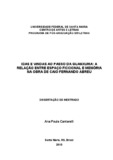| dc.creator | Cantarelli, Ana Paula | |
| dc.date.accessioned | 2010-02-25 | |
| dc.date.available | 2010-02-25 | |
| dc.date.issued | 2010-01-25 | |
| dc.identifier.citation | CANTARELLI, Ana Paula. Coming in and going out from Passo da Guanxuma: relation between fictional space and memory in the works of Caio Fernando Abreu. 2010. 137 f. Dissertação (Mestrado em Letras) - Universidade Federal de Santa Maria, Santa Maria, 2010. | por |
| dc.identifier.uri | http://repositorio.ufsm.br/handle/1/9812 | |
| dc.description.abstract | In 1984, Caio Fernando Abreu created the fictional city of Passo da Guanxuma. Characterizing it as a country town, through the years, this space has assumed a very
peculiar signification in the works of this author, as well as a singular location, being situated aside real cities. In this study, we propose ourselves to list the allusions to this place found through the work of Abreu, relating them and comparing them, at the same time that we try to establish a dialogue among characters, actions and space and time references related to it, composing a great open and fractionated novel, in which the analyzed texts present themselves as pieces, as fragments. To reach our goal, we divide this work in three parts. In the first part, we present the biography of the studied author and the analysis of the works that have references to the fictional city studied. In the second, we discuss some aspects of literature in the contemporaneity and do some approaches with Abreu s works, highlighting the reader s role. We also present some considerations about the displacement feeling of characters that migrated from Passo to the great metropolis, relating them with the foreigners sign. In the third, we discuss the globalizing process, the attempt of homogenization that reigns in the metropolis all around the world generating conflicts between the propositions of a universalization (act of turning something universal) and the resistance of the regional cultures, the constant changes in the panorama of big cities and, consequently, in the individuals that inhabit them. We also discuss impossibility of return, although the characters are willing for it, because that individual that have left became other in the same way that the city left behind have also changed, what turns Passo da Guanxuma an even more particular space. | eng |
| dc.description.sponsorship | Coordenação de Aperfeiçoamento de Pessoal de Nível Superior | |
| dc.format | application/pdf | por |
| dc.language | por | por |
| dc.publisher | Universidade Federal de Santa Maria | por |
| dc.rights | Acesso Aberto | por |
| dc.subject | Caio Fernando Abreu | por |
| dc.subject | Passo da Guanxuma | por |
| dc.subject | Metrópole | por |
| dc.subject | Estrangeiro | por |
| dc.subject | Metropolis | eng |
| dc.subject | Foreigner | eng |
| dc.title | Idas e vindas ao Passo da Guanxuma: a relação entre espaço ficcional e memória na obra de Caio Fernando Abreu | por |
| dc.title.alternative | Coming in and going out from Passo da Guanxuma: relation between fictional space and memory in the works of Caio Fernando Abreu | eng |
| dc.type | Dissertação | por |
| dc.description.resumo | Em 1984, Caio Fernando Abreu criou a cidade ficcional de Passo da Guanxuma. Caracterizado como uma cidade interiorana, esse espaço, com o passar dos anos, assumiu
uma significação muito particular na obra desse escritor, bem como uma localização singular, figurando ao lado de municípios com existência real. Neste estudo, nos propomos
a elencar as alusões a esse espaço encontradas ao longo da obra de Abreu, relacionandoas e comparando-as, ao mesmo tempo em que tentamos estabelecer um diálogo entre as
personagens, as ações e as referências temporais e espaciais a ele relacionadas, compondo um grande romance aberto e fracionado, no qual os textos analisados apresentam-se como trechos, como fragmentos. Para alcançar nosso objetivo dividimos esse trabalho em três partes. Na primeira, apresentamos a biografia do autor estudado e a análise das obras que contêm referências à cidade ficcional estudada. Na segunda, discutimos alguns aspectos da literatura na contemporaneidade e realizamos aproximações com a obra de Abreu, destacando o papel do leitor. Também apresentamos algumas considerações sob o sentimento de deslocamento presente nas personagens que migraram do Passo rumo a grandes metrópoles, relacionando-as com o signo do estrangeiro. Na terceira, discutimos o processo globalizante, a tentativa de homogeneização que impera nas metrópoles ao redor do mundo gerando confrontos entre a proposição de uma
universalização e a resistência das culturas regionais; as constantes mudanças no panorama das grandes cidades e, consequentemente, nos indivíduos que nelas habitam.
Também abordamos a impossibilidade de retorno, apesar das personagens o almejarem, pois o indivíduo que partiu tornou-se outro da mesma maneira que a cidade deixada para
trás também mudou, o que torna o Passo da Guanxuma um espaço ainda mais particular. | por |
| dc.contributor.advisor1 | Umbach, Rosani Úrsula Ketzer | |
| dc.contributor.advisor1Lattes | http://lattes.cnpq.br/5773862679226891 | por |
| dc.contributor.referee1 | Silva, Marcia Ivana de Lima e | |
| dc.contributor.referee1Lattes | http://lattes.cnpq.br/8627082926847683 | por |
| dc.contributor.referee2 | Ourique, João Luis Pereira | |
| dc.contributor.referee2Lattes | http://lattes.cnpq.br/4095677614469415 | por |
| dc.creator.Lattes | http://lattes.cnpq.br/4368704334527187 | por |
| dc.publisher.country | BR | por |
| dc.publisher.department | Letras | por |
| dc.publisher.initials | UFSM | por |
| dc.publisher.program | Programa de Pós-Graduação em Letras | por |
| dc.subject.cnpq | CNPQ::LINGUISTICA, LETRAS E ARTES::LETRAS | por |


